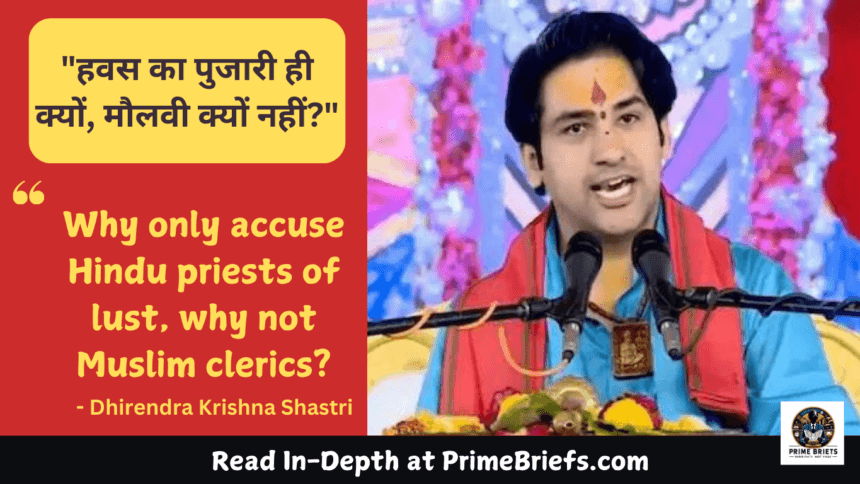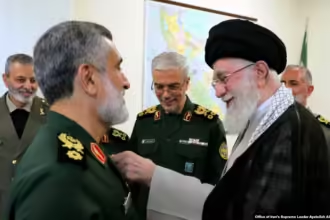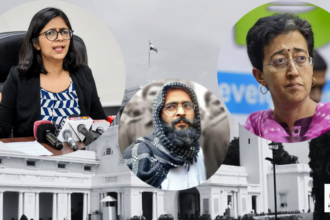In a recent public address, Bageshwar Baba, also known as Dhirendra Krishna Shastri of Bageshwar Dham, made a provocative statement that has triggered heated debates and controversies across religious and social circles. His remark, “Hawas ka pujari hi kyun, maulvi kyun nahi?” (“Why only accuse Hindu priests of lust, why not Muslim clerics?”), has raised concerns about religious tolerance, the role of spiritual leaders, and the growing polarization in Indian society. This article delves into the context of his statement, its implications, and the ensuing reactions.
Context Behind Bageshwar Baba’s Remarks
Bageshwar Baba, a prominent spiritual leader, often addresses various socio-religious issues during his public sermons. Known for his straightforward and at times controversial views, he has garnered a large following, especially in the northern regions of India. His latest statement came amidst discussions about morality and religious conduct, where he seemed to question why only Hindu priests are targeted and stereotyped when it comes to issues of lust, while Muslim clerics often escape similar scrutiny.
The statement, “Hawas ka pujari hi kyun, maulvi kyun nahi,” directly challenges the perceived double standards in societal attitudes towards religious figures of different faiths. Baba Shastri’s comments seemed to reflect a sentiment that Hindu priests are unfairly criticized or accused of misconduct while Islamic clerics are not held to the same level of scrutiny. This remark quickly spread across social media, igniting discussions on the complexities of inter-religious dynamics in India.
Bageshwar Baba’s Influence and Role in Religious Discourse
Dhirendra Krishna Shastri, known as Bageshwar Baba, hails from the Bageshwar Dham in Madhya Pradesh and is a revered spiritual leader with a large following. His sermons often touch upon various societal issues, ranging from spirituality to politics. His straightforward approach and willingness to address controversial topics have made him a polarizing figure. Supporters see him as a voice advocating for Hindu pride and values, while critics often view his statements as provocative or divisive.
The current controversy surrounding his statement is not the first time Bageshwar Baba has found himself in the eye of a storm. His previous speeches have often included strong commentary on religious, cultural, and political matters, which resonate with his audience but also attract backlash from opposing quarters. The recent remark, however, is particularly charged as it directly addresses religious biases and the treatment of Hindu priests versus Muslim clerics.
Reactions to the Remark: Divided Opinions and Controversy
Bageshwar Baba’s statement has sparked a wave of reactions from various sections of society. On one hand, his supporters argue that he is merely highlighting an ongoing issue of bias and discrimination against Hindu religious figures. They believe his words are a call for a fair assessment of all religious leaders, urging society to hold everyone equally accountable regardless of their faith.
Conversely, critics have condemned his remarks as inflammatory and divisive. They argue that such statements can fuel religious tensions and deepen divides within an already polarized society. Some have accused him of playing into communal politics, which can further incite negative sentiments between different religious communities.
Religious scholars and social commentators have also weighed in on the issue. Some have pointed out that spiritual leaders like Bageshwar Baba hold significant influence over their followers and, therefore, have a responsibility to promote harmony and avoid making generalized statements that could be misconstrued or escalate tensions. Others, however, have defended his right to free speech, arguing that it is essential to address perceived biases and double standards within religious discourse.
Bageshwar Baba’s Support Base and the Role of Social Media
Bageshwar Baba commands a strong support base, both online and offline. His followers view him as a custodian of Hindu traditions and values, often rallying behind him when he addresses controversial subjects. This recent remark has been widely shared on social media platforms, with his supporters using the hashtag #BageshwarBaba to express solidarity and amplify his message.
On platforms like Twitter and Facebook, the statement has fueled discussions about media representation of religious figures, religious freedom, and societal biases. Many of his followers argue that Hindu priests are disproportionately targeted in the media when it comes to issues of misconduct, whereas similar incidents involving clerics of other faiths do not receive the same attention. This sentiment resonates with a broader narrative of perceived marginalization among sections of the Hindu community.
The Broader Implications of the Remark
Bageshwar Baba’s comments open up a larger debate about the treatment of religious figures in Indian society. While his statement is framed within the context of Hindu-Muslim dynamics, it also touches upon the broader issue of how spiritual leaders are held accountable for their actions.
Religious scandals, whether involving Hindu priests, Muslim clerics, or Christian pastors, have periodically surfaced, sparking public outrage and debates about morality and ethics. However, the perception of biased scrutiny towards certain religious figures over others remains a contentious issue. Bageshwar Baba’s statement reflects this ongoing tension and raises questions about how media, society, and religious communities address such matters.
The controversy also brings to light the delicate balance between freedom of speech and the responsibility that comes with public influence. Spiritual leaders like Bageshwar Baba wield significant influence, and their words can have wide-reaching effects, especially in a diverse and sensitive religious landscape like India’s. Therefore, their statements carry the potential to either foster harmony or exacerbate tensions, depending on how they are framed and received.
The Need for Responsible Discourse in Religious Matters
Bageshwar Baba’s controversial remark underscores the importance of responsible discourse in religious matters. While freedom of expression is a fundamental right, it comes with the responsibility to avoid statements that could potentially incite division or hatred. In a country as diverse as India, where different faiths coexist, public figures, especially spiritual leaders, play a crucial role in guiding societal attitudes and fostering inter-religious harmony.
Constructive dialogue on religious accountability, biases, and representation is essential for a balanced understanding of these issues. While Bageshwar Baba’s remarks have sparked debate, they also serve as a reminder of the ongoing need to address perceived biases within society in a way that promotes mutual respect and understanding rather than fueling conflict.
Conclusion
Bageshwar Baba’s remark, “Hawas ka pujari hi kyun, maulvi kyun nahi,” has sparked widespread controversy and debate, highlighting the complexities of religious dynamics in India. His statement, reflecting a sentiment of perceived bias, has found both supporters and critics, igniting discussions on the representation of religious figures and the role of spiritual leaders in society. As India continues to navigate its diverse cultural and religious landscape, the importance of responsible dialogue and mutual respect in addressing these sensitive issues becomes ever more crucial.









